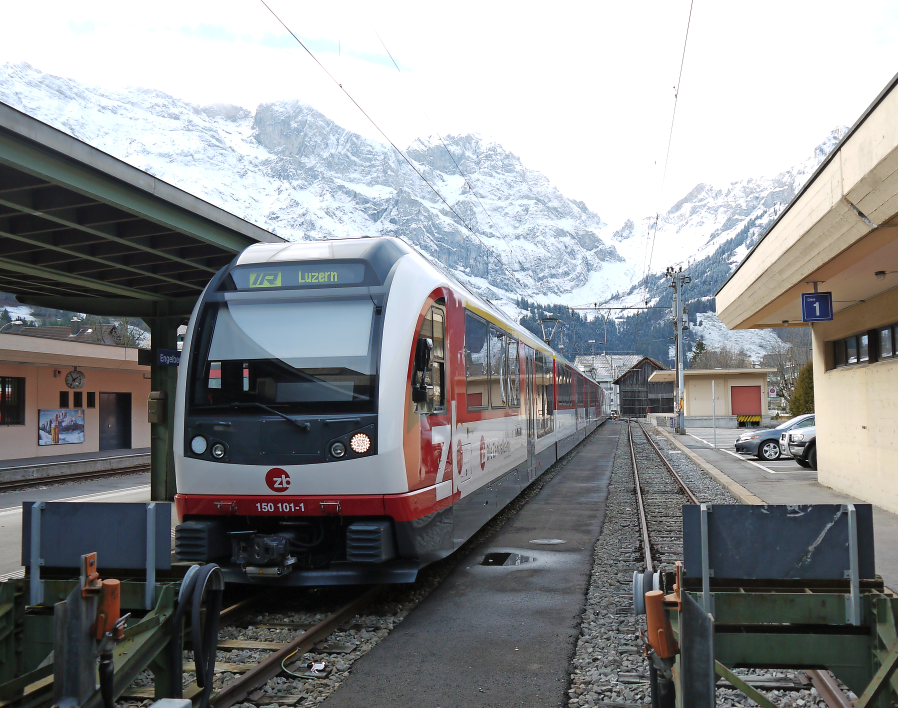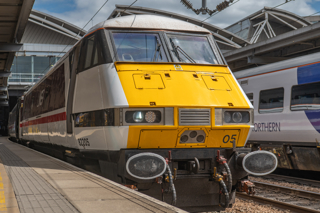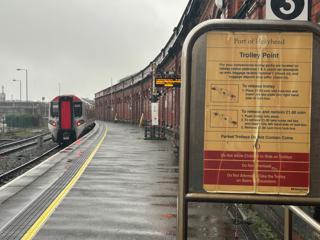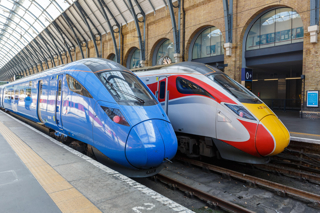How did a small family company specialising in bespoke trains for narrow gauge and mountain railways become one of the fastest growing and most innovative train builders in Europe in less than 20 years?
In a world dominated by the three global giants - Alstom, Bombardier and Siemens - Stadler Rail has become a serious player, competing for major orders from incumbent national operators. But it is also taking advantage of the trends towards regionalisation and open access operation to win smaller orders for its railcars, light rail vehicles and multiple units.
In the mid-1990s Stadler employed only around 100 people, but since the turn of the century it has grown rapidly - today the total is more than 7,000 employees over 20 countries worldwide, producing hundreds of rail vehicles, trams, locomotives and coaches per year, managing maintenance contracts and refurbishment programmes, and supporting operators across Europe, the USA and the Middle East-North Africa region.
Peter Jenelten, Executive Vice-President for Marketing and Sales, and Ralf Warwel, Director of UK Sales, are leading Stadler’s UK programme. Although it is still early days for the company in this country, it is moving swiftly to set up a permanent presence and to design the trains it will build for British operators. Like any successful company, Stadler has taken advantage of changing market conditions, but it has also benefited from being in the right place at the right time, capitalising on dissatisfaction with the ‘big three’ to win large orders.
Alstom, Bombardier and Siemens have all experienced extensive delays in recent years, both in the design and construction of new trains and in getting them approved for use on European railways - most notably in Germany.
However, Stadler prides itself on being extremely accurate on delivery deadlines and on being able to deliver new trains at short notice when required. A recent example was the debut of a section of the new EC250 ‘Giruno’ train for Swiss Federal Railways, at Innotrans in September 2016. Stadler’s first high-speed train was rolled out in Berlin just 23 months after the contract was signed.
How is the company able to do what others have failed to achieve, and deliver new trains so quickly?
Jenelten explains: “We have a well-motivated team across the group - teams at all levels work together to develop ‘best in class’ vehicles for our operators. It’s essential to analyse the customer’s specification and try to give the best solution.
“Another advantage we have is that we’re a family-owned company - our owner is also the Group CEO, and we can make decisions very quickly. Time to market for products is an important selling point, and you can achieve short timescales if you have a lean organisation and structure.”
What has drawn Stadler to the UK market, and why now?
“It’s a long story,” laughs Jenelten. “The UK is the country of railways, but it’s also very demanding. Companies need to have the production capacity and engineering resources needed to deliver big orders quickly, and to handle all the requirements.
“I worked for Adtranz in the 1990s. We worked with Brush Traction on two major orders for the Eurotunnel shuttle locomotives and the Class 92s. The ‘92s’ were an interesting case because we signed contracts with SNCF and BR, but a couple of months later BR disappeared. We were the first to go through all the new processes for homologation, dealing with new organisations, and this process was very, very demanding.
“For many years afterwards I said to our owner, Peter Spuhler, that we needed to grow and gain more experience before we could enter the UK market. Two years ago we saw that there were a lot of new projects coming through, so we started to look at what we could offer in the UK.”
The company places great faith in its ability to deliver trains that work reliably ‘out of the box’ - something that will be vital if Stadler is to meet the ambitious target of having its first FLIRT UK trains running in the UK in 2019. How important is this to the company’s culture?
“Ask our customers around Europe and we have an image of being reliable, not only in the reliability of our trains but in delivery of our contracts.” says Jenelten.
“We deliver on time and to the right quality. We have an excellent track record and the railway community knows it - that has been essential to the success we’ve had. We also try to base our products on existing experience, and don’t jump into taking risks which we cannot manage later.
“Our first UK contract was the extra trams for Croydon Tramlink. This required a very short delivery time , and we were the only people who could fulfil this. We have to analyse areas where we have an advantage or can meet the certain peculiarities of an order.
“One of our latest projects is for the Glasgow Subway, and is a classic Stadler ‘tailor made’ solution. This metro system has very special requirements, particularly in the size of the car bodies, so that’s why we went for that first. In parallel we took on the Sheffield tram-train project in Valencia (formerly Vossloh), which is also a tailor-made product.”
Founded as an engineering office by Ernst Stadler in 1942, the company started to build battery-electric and diesel locomotives in 1945. Passenger vehicle production didn’t commence until 1984, but really took off in the mid to late-1990s with the launch of new products and the acquisition of two other Swiss factories building specialist rail vehicles for rack-and-pinion and narrow gauge railways.
Much of Stadler’s success has also come from offering innovative products which can be closely tailored to individual requirements, and from absorbing popular or upcoming designs through a series of acquisitions. Two product lines in particular stand out, as they played a huge role in establishing Stadler’s credentials in the late-1990s and early-2000s.
The RS1 ‘Regio-Shuttle’ diesel railcar was designed and originally built by Adtranz. But when this group was acquired by Bombardier in 2000, European Union competition authorities insisted that its regional and tram products be divested. Initially, Stadler operated a joint venture with Adtranz, but in 2001 it took 100% ownership of the Pankow factory in Berlin, giving it a manufacturing base in Germany for the first time.
Since then, the RS1 has become almost the standard railcar in Germany. More than 800 have been built (497 of them built and sold by Stadler), and used by dozens of regional operators as well as Deutsche Bahn and Czech Railways. Pankow has also proved to be a vital tool in winning orders for the enormous German regional train market, which has been transformed since the turn of the century.
More than 600 of Stadler’s own GTW design (short for Gelenktriebwagen, or articulated railcar) have been produced since 1995 in diesel, electric, standard and narrow gauge form. Units have been sold to Switzerland, Germany, Slovakia, Italy and the Netherlands, as well as further afield. The GTW is based around a central power pack onto which two or more unpowered, lightweight passenger vehicles are hung - an arrangement pioneered by the Great Northern Railway (Ireland) in 1936!
However, Stadler’s biggest success has come with its Fast Light Innovative Regional Train (FLIRT), the first of which were delivered to Swiss Federal Railways in 2004 (see RAIL 810). More than 1,400 of these low-floor, articulated regional trains have since been sold to 16 countries across Europe, plus the USA, Algeria and Azerbaijan.
FLIRTs come in many different shapes and sizes - from three-car regional sets to luxurious inter-city units, wide-bodied units for Scandinavia, and broad gauge versions for Finland and former Soviet Union countries. Diesel FLIRTs have also been produced for Estonia, and the Valle d’Aosta Region in northwest Italy has ordered the first electro-diesel sets for delivery in 2018.
Greater Anglia will add two further variants to the family from 2019, with 378 vehicles built in Bussnang to the UK loading gauge and formed into 20 12-car inter-city/Stansted Express 25kV AC electric sets, 24 four-car and 14 three-car electro-diesel regional units. This £610 million order was Stadler’s first for main line trains in the UK, and part of a £1.54 billion total fleet replacement programme by GA franchise holder Abellio. Stadler will also maintain the new trains at Norwich Crown Point depot.
How much of a challenge is it to adapt the tried and tested FLIRT design to UK conditions - most notably our restrictive loading gauge?
Jenelten explains: “When we took the strategic decision to enter the UK market two years ago, we ran feasibility studies, made drawings and designs, and worked with Network Rail, train operators and leasing companies to develop a strong idea of what was required. We’re confident that this will not create a problem for us, or the delivery timeline. We are working with a very experienced operator and customer in Abellio.”
Warwel adds: “We have also engaged with a number of experienced UK-based partners, and set up working groups with various stakeholders to help us as we gain the experience that we still lack. We’re buying in experts to help us.
“Roughly three months after signing the contract we have already built a wooden mock-up for the design review. This allows us to check whether the equipment all fits into the car body, if it suits the customer, and we can involve stakeholders such as disabled groups in the process at this stage. We don’t want to have any negative experiences later.
“The whole basis of the procurement of the new Anglia fleet is to have it in place before the new PRM (Persons of Restricted Mobility) regulations come into force on January 1 2020. So we will start delivery in spring 2019 and all 58 trains will be in service by the end of the year.”
Success with the FLIRT family spurred on Stadler to extend its product range in the late 2000s, adding the KISS double-deck electric multiple unit from 2008. Originally developed for Swiss Federal Railways (SBB) for Zürich area commuter services, more than 250 trains have now been sold to operators in Switzerland, Austria, Germany, Luxembourg, Sweden, Russia, Azerbaijan, Georgia and the USA for both regional and inter-city work.
Over the same period, many Swiss narrow gauge and mountain railways have modernised their fleets. This has required Stadler to produce many small production runs of ‘tailor-made’ trains suited to the particular characteristics of these diverse lines serving commuters, tourists and busy regional routes.
Outside Switzerland, Stadler’s expansion has been accompanied by the development of new assembly facilities in Hungary (2005) and Poland (2006), serving the growing eastern European market, and in Belarus (2012) for the former Soviet republics.
Further acquisitions have also resulted in the Swiss company Winpro AG of Winterthur (2005), Voith Rail Services of the Netherlands (2013) and Vossloh Rail Vehicles of Valencia (2015, RAIL 816) being brought into the fold, broadening the range of products and services Stadler can offer.
Light rail and metro is increasingly important to the group, with Variobahn trams being delivered to operators in Germany, Norway and Croydon Tramlink in the UK in recent years. Stadler’s first contracts for underground trains came from Berlin in 2015, but the company’s biggest success in this area came in December 2015 when, in a joint venture with Siemens, it won a massive framework order for up to 1,380 vehicles from Berlin S-Bahn, to be completed by 2023.
The £92m order for 17 underground trains for Glasgow’s Subway was also won from Strathclyde Passenger Transport in March 2016. Part of a £200m upgrade package won with Ansaldo STS, the trains will be Stadler’s first for an automatic, driverless system. They will be built at Altenrhein in Switzerland.
That was followed in December by another coup for the Swiss, winning a £460m order for bespoke electric trains from Merseytravel (RAIL 817), although this is currently subject to a legal challenge from Bombardier. These four-car articulated metro-style EMUs will be delivered in 2019-20 to replace ex-BR Class 507s and ‘508s’ dating from the late 1970s. More than 200 vehicles will be formed into 52 trains able to carry 60% more passengers than the current fleet. One train per week will be delivered from the summer of 2019.
More unusual orders have included ten passenger coaches for Canada’s ‘Rocky Mountaineer’ tourist operation and 30 luxurious gauge-changing sleeping car and restaurant coaches for Azerbaijan Railways’ future service between Baku, Tbilisi (Georgia) and Turkey.
If it wins more orders from UK operators, will Stadler consider building an assembly plant here, as it has in Hungary and Poland?
“I would not exclude it,” says Jenelten. “We’re always positive and analysing opportunities, but we only signed the GA deal three months ago, so it’s all still quite new.
“GA gives us a strong presence in maintenance with around 200 employees there soon. We also hope that we can develop the UK supply industry - as we have in other countries where we’ve won contracts, such as Finland. A Finnish company now supplies more than 50% of our passenger information systems. A weak Pound should be an advantage for UK suppliers.
“Ralf and our procurement department are talking to UK suppliers already. We’re looking for sustainable development opportunities, and by March we’ll know what possibilities there are. We’re always analysing and we can move very fast - never say ‘no’!”
What can British passengers expect from Stadler trains that they might not see from other suppliers?
“We are well known for reliable trains - we are proud of the Swiss quality we deliver to our customers, and we try to provide more comfort for our passengers. For example, we have stepless entrances - sliding steps so there’s no gap between train and platform, and no stairs within the car. We also use high-quality materials for our interiors - something that you can feel when you travel on them. Last but not least, for our operators we can deliver lower lifecycle costs because the trains are built to be reliable.”
Do those higher quality materials mean that Stadler’s trains are more expensive than their rivals?
“Evidence doesn’t confirm that,” responds Warwel. “We try to equalise it through other methods, but we feel we’re on the same price level as our competitors.”
Jenelten adds: “Our experience shows that it makes sense to install more quality at the start, as this will have a positive impact on the warranty costs later.”
Despite its remarkable successes over the last decade and a half, it hasn’t always been straightforward for Stadler. After record-breaking numbers of orders in 2014, the company felt the after-effects of the Swiss Government’s decision to remove the exchange rate cap with the Euro in 2015.
At 2.1 billion Swiss Francs (CHF), the amount of orders received in 2015 was good, but lower than in the previous two years, in which orders totalled CHF2.6bn and CHF2.8bn respectively. However, its profit margins collapsed due to the unfavourable exchange rate. This ‘Frankenschock’ cost Stadler more than CHF 100 million - an amount that would otherwise have funded innovations.
Over the past couple of years, Stadler has also been exposed to the financial crisis in Russia and its effects on neighbouring countries. Orders for KISS double-deck EMUs have been cut back or cancelled, although some of the trains already built have been sold to Georgia and Azerbaijan.
Does the UK’s decision to leave the European Union make it a more or less attractive environment for Stadler?
“It remains attractive,” confirms Jenelten. “I’m convinced that the politicians will ensure there’s no gap for businesses when the UK exits the EU. There are working groups already between the UK and other countries - including Switzerland - to safeguard economic and trading relationships. We don’t expect any negative impact. The exchange rate with the Swiss Franc has always been volatile, but this is normal business for us.”
Acquisitions of facilities such as Vossloh’s Valencia plant, and the recent move into the UK and US markets, are part of the company’s new core strategy to expand into new market segments and launch a range of new products.
As well as its established families of passenger trains, Stadler can now also supply diesel, electric and hybrid locomotives - including Europe’s most powerful diesel design, the EURO4000 - and tram-trains, such as the ‘Citylink’ type being delivered to Sheffield Supertram and Karlsruhe in Germany. Do Jenelten and Warwel have their eye on any other UK rail contracts?
“Yes, of course,” replies Jenelten enthusiastically. “We have analysed the franchises coming up for renewal and are in contact with financial institutions, potential bidders and so on, and we’re aiming to win more contracts. The exception is HS2, because we don’t have any very high speed trains in our product range.”
As it prepares to celebrate its 75th anniversary in May 2017, Stadler gives every impression of a company determined to become Europe’s fourth global player in the rail vehicles market. While it may still be an unknown quantity to British rail users, if Greater Anglia’s FLIRTs and Merseyrail’s new trains live up to the high standards of quality and reliability set by Stadler trains elsewhere in Europe, they could set a new benchmark for British passenger trains.
















AndrewJG8918 - 05/09/2019 02:17
Stadler should continue on manufacturing more new trains including the Class 777 "Metro" to replace the Merseyrail's ageing Class 507 and Class 508 stocks. And to continue on manufacturing more new Flirt stocks including replacing the Class 455 and Class 313 on Southern.